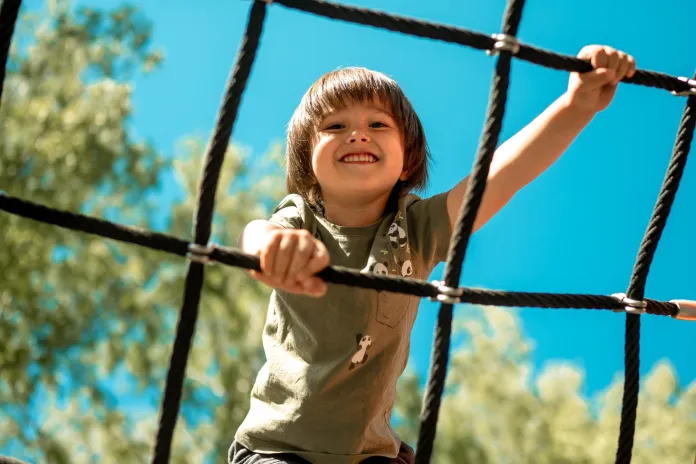The Awesome Power of Play
What makes playfulness so important, and how can we bring more of it into our lives?

Have you ever watched a baby make faces at herself in a mirror? Or observed a toddler create an entire land of make-believe from a cardboard box? We expect kids to become completely absorbed in play for hours on end. What we might not realize is how much play factors into healthy human development and wellbeing—for kids and grownups alike.
According to a study from the American Academy of Pediatrics, play “contributes to the cognitive, physical, social, and emotional well-being of children and youth.” Through play, kids learn how to solve problems, understand cause and effect, and discover a range of communication styles.
What happens when we stop playing?
As we grow older, we start focusing more on the commitments that come with having jobs, building families, and participating in communities. And while that shift to honoring commitments and taking responsibility represents a healthy progression in our adult development, we also need to balance this “grown-up” awareness with moments of play—or at least a playful approach to life.
If we don’t, say experts, every part of our lives can feel less … alive. Leading play researcher Dr. Stuart Brown a lack of play affects our physical, mental, and spiritual well-being. “Suppressing the instinct to play … makes children and adults more vulnerable to depression, anxiety, impulsivity and sedentarism,” he says.
Often, the people suppressing a child or adult’s instinct to play are adults and caregivers who worry play takes away from more serious or “important” pursuits. That’s because until recently, the extraordinary benefits of play weren’t widely studied or understood.
The incredible benefits of play
When we make time for play, we bring balance to mind, body, and spirit. Play can help us:
- Build strong, healthy bodies. Movement play supports bones, muscles, lungs, and heart. It can help reduce risks of obesity, diabetes, and high cholesterol.
- Improve mental health. Playing builds confidence and problem-solving skills, and can reduce effects of depression and anxiety.
- Strengthen community connections. When we play in a group or with others, we expand our skills of cooperation, problem-solving, and conflict resolution.
- Develop our appreciation for nature. Exploring our natural world through play taps us into the wisdom and mystery of nature.
- Express ourselves. When we “lose ourselves” in the process of doing something we love, we feel inspired, creative, and whole.
How often should we play?
According to play expert and creative strategist Yesim Kunter, we should find a way to play every single day. Or, at the very least, we should embrace our day with a mindset of playfulness.
“Having a playful mind is the most important thing,” he says. “But implementing ‘play-time’ into your daily routine will strengthen your ability to cope with stress and bring joy into your life.”
So don’t worry if you feel like you’re not quite sure how to play in the way you used to (or as often). Research shows that for adults, playfulness most often “blends with other attitudes and motivations having to do with adult responsibilities.” We can be assured that even if we don’t get to that 100% playful state so easily reached in childhood, we can still be playful.
Ways to play at the Y
Here at the Y, we’ve always championed the role of play in the lives of adults, teens, and kids. Our gym facilities, community centers, camps, and more offer opportunities for people to explore ideas, build connections, and stay moving.
We’re constantly adding new programs and workshops to our offerings. We invite you to try classes like Tai Chi or Gentle Yoga, breathwork, soundbath, or meditation. Each of these unique experiences can help you relax your mind and body, while giving you tools to play with on your own.
Ready, set … play!
You don’t have to commit to an activity for hours on end to enjoy the benefits of play. Here are some starter ideas for creating a “play every day” routine:
- Set a timer for 5 minutes and draw something from memory (your pet, your favorite food, your best friend). The only rule: You can’t judge it as “good” or “bad.”
- Look in the mirror and do your best impression of an actor or comedian you love.
- Take yourself on a walk with a camera assignment. Use a phone or camera to snap shots of strange-looking clouds, beautiful fall colors, or interesting front doors.
- Write out all the letters in your first, middle, and last names. See how many other words you can create from them in 5 minutes.
- Write the kind of poem you might have written (or did write!) as a teenager. Make it as angsty and melodramatic as possible. Now write about the same topic from the point of view of a 6-year-old.
- Make a list of as many animals / state capitals / rivers (etc.) as you can in 5 minutes. Channel your inner grade-schooler!
- Spend a few minutes exploring your 5 senses. Close your eyes and take 1-2 minutes to see how many sounds you can identify around you. Then move to sensations / touch. Then smell. Then taste. When it’s time to explore your sense of sight, you can do so with eyes open or closed!
- Take one item from your to-do list, and perform it the way you think a toddler would. Be ready to laugh at yourself!